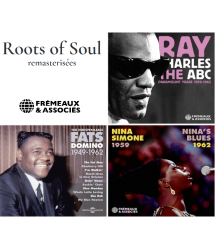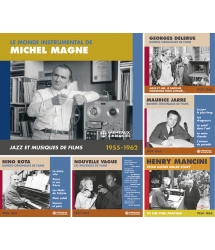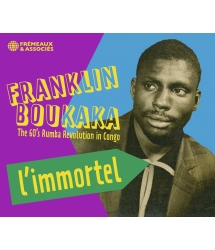Despite being one of the most instrumental musicians in the rumba revolution that took place across the two Congos during the 60s, Franklin Boukaka's legacy has been largely forgotten. Singer, songwriter, guitarist and political activist, he was killed in 1972, aged just 31 (the accompanying liner notes graphically depict his murder during a failed military coup). His music was quickly censored from the airwaves and as a result he is now almost unknown to the younger generation. This monumental compilation, amassing over three hours of long lost vinyls and recordings, is a testament to Boukaka's contribution to Congolese rumba and cultural identity, and a chance to restore his legacy for future generations.
Recently added to UNESCO's list of Intangible Cultural Heritage, Congolese rumba was born of the transatlantic interchange between the two Congos (known today as the Republic of Congo and the Democratic Republic th of Congo) and Cuba. The style was fundamental in the liberation movements of both Congo-Brazzaville and Congo-Kinshasa, also helping to reconcile the two nations. Its popularity has since spread throughout much of Africa and its diaspora and has been influential in the development of many of the musical styles that have followed.
Franklin Boukaka was born into a family of musicians, and began his own musical apprenticeship at age 15, earning his stripes singing and playing in various bands and orchestras (Sexy Jazz, Negro Band, Sympathic Jazz, Jazz Africain, Vox Africa). Boukaka left Brazzaville in 1957, crossing the river which separated French Congo from Belgian Congo to tour in Leopoldville (today's with Sympathic Jazz; it was here that he witnessed the political activism taking place in the struggle for independence, and became conscious of the need for action to national sovereignty.
French Congo got their independence in 1960, one year after Boukaka's return to Brazzaville where he joined Orchestre Cercul Jazz, quickly becoming their star attraction. For Boukaka, culture and revolution went hand in hand, and his songs took on a more politicised form, with lyrics which called for pan-African unity and openly denounced government corruption. He was innovative in his approach to music, incorporating traditional instruments into his more modern, urban style by performing with a group of sanza (a type of thumb piano) musicians. While this collaboration may not seem particularly groundbreaking today, it was unheard of at the time, and Franklin's trailblazing performance with his sanza group at the first Congo Cultural Week in 1967 was the first of its kind in the region.
The “L'immortel” project, spearheaded by Claude Blanchard Ngokoudi, took almost six years of investigating, interviewing and vinyl-hunting to uncover and amass all the recordings featured in this compilation. The original idea was to re-release one album (“Le Bucheron”), but on researching Boukaka's repertoire, and after multiple meetings with Boukaka's son, Malcolm, and sister, Alphonsine B, the three became aware of just how much of Boukaka's music had been lost so much so that even his own son had never heard many of the recordings which were unearthed during this project.
The re-release is a retrospective made up of three discs, working backwards through his career. The first focuses on his most well-known and widely-preserved record, “Le Bucheron”, arranged by Manu Dibango; the second unearths a treasure-trove of his pioneering work with his sanzas, also featuring a handful of collaborations with Keletegui et ses Tambourinis; the third and final disc shines a spotlight on his earlier repertoire with Orchestre Cercul Jazz..
The differences are marked. Take the track 'Pont sur le Congo', which features twice on the collection: the version recorded in the mid-60s with Cercul Jazz features more classically rumba timbres while the version released in 1971 on “Le Bucheron” (the year before his assassination), when Boukaka had forged a more unique musical style, has a contrasting ambience. The Cuban influence that is so integral to Congolese rumba is on both versions, but employed to very different effect.
One of the real treats on this album are the tracks recorded with Keletigui et ses Tambourinis, an offshoot of Guinea's legendary Syli Orchestre National, formed in the “authenticité” era a return to traditional musics and an abolishment of all colonial-tinged styles. Franklin Boukaka was an outspoken advocate of pan-Africanism, and these tracks are a rare peek into some of his more extended pan-African collaborations.
“L'immortel” is an excellent compilation which reveals the evolution of a pioneering and passionate artist, and will hopefully succeed in reversing some of the damage done by the censorship placed on him by bringing Franklin Boukaka's music to a new generation.
Par Lucy HALLAM - SONGLINES











